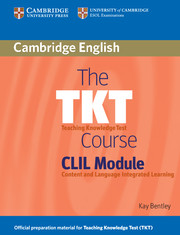Unit 5 - Learning skills across the curriculum
Published online by Cambridge University Press: 27 September 2023
Summary
What are learning skills?
The learning process is complex. Learners learn by exploring their environment and by interacting with people. This is part of active learning. In school, learners develop more than knowledge of different subjects; they need to develop positive attitudes, learning skills and learning strategies. Learning skills can be applied across the curriculum. They are skills which involve learning how to learn and developing learner autonomy. They can be artistic, cultural, linguistic, mathematical, scientific, social and interpersonal skills.
Key concepts
Here are some learning skills with examples of when they are used in the classroom.
Key concepts and the CLIL classroom
In CLIL, learners have the additional challenge of developing learning skills in a non-native language.
Learners need support and encouragement to develop learning skills so they can apply them in a range of contexts. If a mathematics teacher takes time to show learners how to use a spreadsheet on the computer, then learners can use this skill in other curriculum subjects.
We need to plan for learning skills. We also need to plan with colleagues who are teaching other CLIL subjects to the same learners. This is because most learners don't need to have the same skill taught again and again in different subjects, while some learners need time to consolidate what they have learned.
We should plan opportunities for autonomous learning and encourage an enquiry approach (involving learners in problem-based or task-based learning).
All learners need access to learning skills that a community thinks are important. In a global community, these include fast technological communication and data handling (using and interpreting information, often on a computer).
There are differences between subjects such as mathematics and art. Mathematics has subject content which is objective, so learning skills that are developed focus on understanding and achieving ‘correct’ concepts. For example, learners need to work out how to find the circumference of a circle (using knowledge to solve a problem). Art aims to encourage learners’ creativity and expression, so learning skills focus on the process of how they achieve the final product. For example, learners draw then paint a still life (using observation skills and the senses).
- Type
- Chapter
- Information
- The TKT Course CLIL Module , pp. 26 - 29Publisher: Cambridge University PressPrint publication year: 2010



